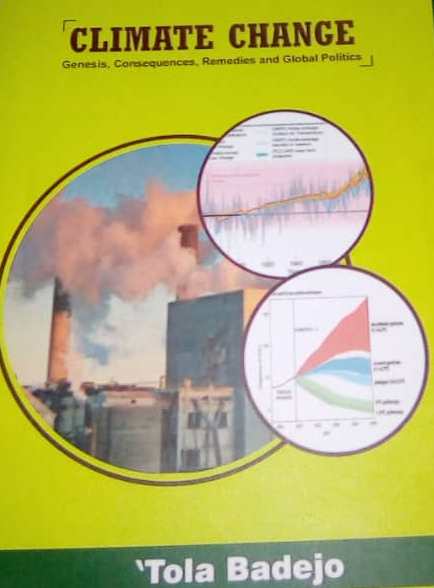TITLE: Climate Change: Genesis, Consequences, Remedies and Global Politics
AUTHOR: Prof ‘Tola Badejo
PUBLISHER: College Press & Publishers Ltd, Jericho, GRA, Ibadan.
NO OF PAGES: 98
REVIEWER: Prof. Francis ‘Yinka Adesina, (Obafemi Awolowo University, Ile-Ife)
Many scholars have written and many are still attempting to put textual materials together on the subject of this book. This has become critical as full-fledged courses in climate change emerge in the curricula of schools and universities across the globe. Indeed, many new courses on the subject are expected to spring up as the clamour for climate change education grows. Development experts largely subscribe to the view that education especially of young people, holds the promise for promoting the type of attitudinal change required to effectively mitigate or at least ameliorate the impacts of climate change, and this is pertinent at all levels. Practitioners as well as students from pre-university to postgraduate level need properly articulated textual materials for awareness creation and or in taking academic courses in climate change. This new book provides such relevant materials. Researchers, students, and even lay persons from diverse backgrounds will find the book immensely relevant. The book is not only very valuable, but also well-timed.
Tola Badejo, is an accomplished Nigerian ecologist with an uncanny love for the natural environment. I knew him as a scientist who combines guided, often intensive field work with laboratory studies. Our paths crossed in his expanding quest to understand how plants and animals are adjusting to changes in the environment on local and regional scales, and in which ways the intensifying human activities are impacting on the environment. Prof Badejo has continued to explore and promote studies in all of these areas at various levels. His desire to motivate advanced research in environmental sustainability led to his founding of an international Journal on the environment – Environtropica, which has become a household publication among many tropical ecologists. As the editor-in-chief of the Journal, he has superintended over the publishing of fifteen (15) volumes to date.
The arduous task of a university administrator never took Prof Badejo off his focus on the environment and since the completion of his tenure as the pioneering Vice-Chancellor of Wesley University, he has continued to research on Sustainable Development and the natural environment. It is therefore not surprising that he has been able to come up with this book. Given his rich experiences on environmental issues in Nigeria and elsewhere, Prof Badejo stands eminently qualified to handle the subject of this book and he has done this beautifully well.
Since about 1979 when the first alarm about the noticeable changes taking place in the earth’s climate was raised, to the formation of the Intergovernmental Panel on Climate Change (IPCC) by WMO and UNEP in 1988, and the negotiation of the United Nations Framework Convention on Climate Change (UNFCCC) during the Rio Summit in 1992, an unprecedented large volumes of scientific publications have continued to accumulate especially in the secretariat and website of the UNFCCC. Contributions have come from all disciplines. Scientists have continued to examine the genesis and prospects of controlling climate change; Legal experts have done a lot on the law and climate change impacts; Social Scientists have looked at the social contexts of climate change; health specialists have continued to look at the health implications of climate change; and experts in technology among others, have worked on concrete strategies to mitigate climate change. This broad response is expected since climate has profound influence on everyone and what we do. Apart from being the basis of virtually all aspects of socio-economic development, it is also a defining parameter of human well-being and survival. Attention of intellectuals globally have thus been directed at understanding the phenomenon of climate change and addressing its impacts.
Professor Badejo has beautifully knitted together the various critical issues ranging from science to politics and economics of climate change in this single reading. He concludes the book with a consideration of arguments arising from climate denials. Thus in one single breath, the reader is introduced to all critical issues in Climate Change.
I believe this valuable book will be a good companion for everyone including among others, mass media practitioners who have to communicate issues on climate change from time to time, religious leaders who will need to speak more and more about changing environment because of its impacts, and the policy makers who need to make informed decisions on the subject from time to time.




























